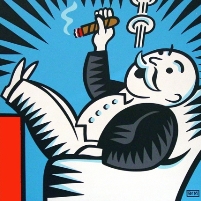Financial Reform: We May Be Stuck Paying for the Breaks Banks Bought
Tuesday, May 25, 2010

One clear indication that the financial industry reform plan adopted by the Senate can’t be that tough is the reaction coming from Wall Street. A longtime investment banker anonymously told The New York Times that there was “a sigh of relief” from many bank executives and traders once they saw that senators were not going to be more draconian with their changes.
The financial sector may well feel satisfied that its lobbying—the most expensive in Washington—paid off. Since 1998, the industry has spent $3.8 billion to influence lawmakers and regulators, more than any other special interest during that span.
Only time will tell if the diluted reform plan Wall Street bought with its lobbying will ultimately cost American taxpayers. In many parts of the Senate legislation, loopholes and other shortcomings exist that could allow firms and banks to partake in risky behavior once again, leading to another bailout at taxpayer expense.
For instance, the plan would require derivatives, previously traded in private, to be bought and sold on exchanges, like stocks. But lawmakers granted an exemption to companies that “use derivatives to reduce the risk of fluctuations in interest rates and commodity prices. Experts say this exception could be exploited,” according to the Associated Press.
As far as bank regulation goes, lawmakers intend to eliminate the ineffectual Office of Thrift Supervision and to toughen rules for big banks. But smaller financial institutions will still have the ability to choose which federal body regulates them, giving them the ability to “shop” for the easiest deal in Washington.
-Noel Brinkerhoff
New Financial Rules Might Not Prevent Next Crisis (by Daniel Wagner and Stevenson Jacobs, Associated Press)
As Reform Takes Shape, Some Relief on Wall St. (by Eric Dash and Nelson Schwartz, New York Times)
- Top Stories
- Unusual News
- Where is the Money Going?
- Controversies
- U.S. and the World
- Appointments and Resignations
- Latest News
- Trump Orders ICE and Border Patrol to Kill More Protestors
- Trump Renames National Football League National Trump League
- Trump to Stop Deportations If…
- Trump Denounces World Series
- What If China Invaded the United States?






Comments